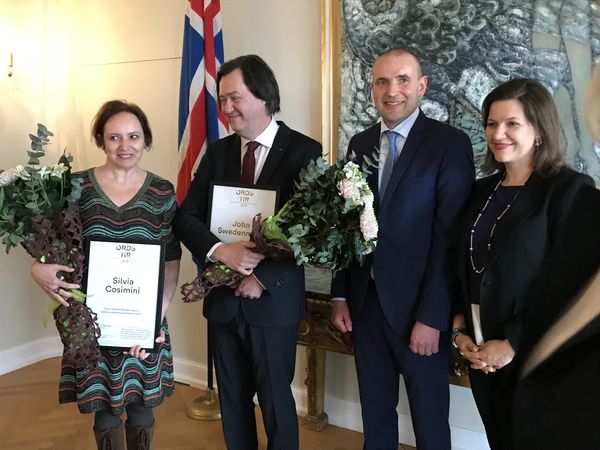“Icelandic changed my life. The more I learned and read, the better I understood that this is my country.”
John Swedenmark is one of the most active translators of Icelandic literature into Swedish and in this interview with Magnús Guðmundsson he tells us about his first encounters with Icelandic, his love of poetry, and the importance of translation for literature.
The Language that Changed my Life
“Icelandic actually came by chance into my life. I have always been an avid reader of poetry and as a young man I dreamt of becoming a poet and a writer. I took courses to learn the art but realised that I am not a poet and when I came to terms with that, I started an education in linguistics. That lead to me needing another language, because it's rather boring to only be able to speak English and French in addition to your mother tongue, so I took an Icelandic course in Uppsala in 1983. I took that course for fun and it changed my life.”
John Swedenmark says the Icelandic course was extremely interesting and the teacher Þorleifur Hauksson was particularly learned and nice. “The more I learned and read the more I understood that this is my country.”
Tricked into the First Translation
It was in fact Þorleifur who tricked Swedenmark, as he puts it, to take on his first translation. “It was Djöflaeyjan by Einar Kárason and when it came down to it, it actually went quite well. I had never planned on becoming a translator but since it went well, I thought that as I was quite good at this I should of course continue.”
Swedenmark says that translating Djöflaeyjan was a great but enjoyable challenge because it is a dynamic book with different registers. “The humour in this book is also so unique and poignant, and translating humour can be difficult. It is for instance almost impossible to translate jokes, they tend to simply die in translation, but at the same time the translation has to render something funny – some relief that maintains the energy of the text. Therefore, I usually don't translate jokes directly but rather find something funny that captures the same dynamic.”
Listened to the Musicians Haukur Morthens, Megas, and Bubbi
Swedenmark came to Iceland for the first time in 1988 when he was working on the translation of Djöflaeyjan. “It was a nightmare. I almost didn't speak a word of Icelandic at the time, but Einar was so nice and was kind to me. We went around town together, looking around where Camp Thule had been, visited the very cool Aggi, paid a visit to Megas and had fun in various ways. I was like an idiot as I could hardly utter a word and was extremely ashamed of that,” Swedenmark says laughing at the memory.
Emails are a Great School
“The translation went swimmingly though, as there is great difference in dealing with the spoken and the written word, but in fact I really didn't learn to speak Icelandic until the Internet came. I started to write my friends emails in Icelandic and that is a great school because it gave me time to think, find the right words, conjugations and so on and so forth. The other thing I used to do was to listen to Icelandic music. I listened to everything with Haukur Morthens, Megas, and Bubbi because through that I had access to the vernacular as opposed to the literary language I worked with when translating.”
Started Slow then Took Off
Swedenmark continued translating Einar Kárason's works and completed five of his novels before moving on to the next author. “Gyrðir Elíasson and I became good friend and I translated Svefnhjólið that came out in the mid 90s. After that not much happened as interest here in Sweden is unfortunately not that great with regard to fiction – though it's a different story when it comes to crime fiction. But I did translate a bit of children's and young adult books, in addition to translating the books nominated for the Nordic Council Literature Prize.
But then it really took off when I was tasked with translating Jón Kalman's work. He was nominated at the time for the Nordic Council Literature Prize for his book Sumarið á bakvið brekkuna, and we became fast friends. I translated his novels Ýmislegt um risafurur og tímann and Sumarljós og svo kemur nóttin and now I've translated nine of his books.”
Look at each Author as an Unknown and each Book as Unique
Among other writers whose work John has also translated are Gerður Kristný, Þórarinn Eldjárn, Linda Vilhjálmsdóttir, Sjón, and Steinunn Sigurðardóttir. Swedenmark says that not only are these different writers, but it is also important to approach each and every book differently. “For instance, when I start translating a new book by Jón Kalman there is always the risk of falling into the trap of starting to write like I think he does. It is dangerous and I have to look at each author as an unknown writer and each book as unique.
Listening for the Right Tone
I need to listen for the right tone because writers are not just telling a story but also creating a narrator. That is where the art lies, in creating a narrator who is not the author even though there is of course always a bit of the author there. I recently, for instance, translated Stormfuglar by Einar Kárason and it was not only difficult to find all the lingo to do with trawler fishing, but it was also hard to find myself in the narrator Lárus because he is so far from me. There is a lot of energy in that book and you are both tired and cold when you finish reading it.”
Proud of Alliteration
Poetry has always been of great importance to Swedenmark and in addition to his translation work Swedenmark has also written a lot about poetry, taught and guided up and coming poets. In 2011 he published the book Baklängesöversättning och andra texter, which is about translation. “I have long been of the mind that it is important to discuss translation in itself and its importance in literature, and this was a part of that.”
Poetry is always on Swedenmark's mind and he says that translating poetry teaches him a lot about the mechanics. “You always need to find the music. It is number one when it comes to poetry. Rhythm, rhyme, and alliteration create this music and I am very proud of having learnt how to alliterate in Swedish because it was not in the language, so I had to invent it myself. I am for instance currently working on a translation of a poem by Gerður Kristný who always uses alliteration and it is starting to come naturally in translation, which pleases me.”
An Awful Salesman
When asked whether he has much say on what books he translates Swedenmark says that he sadly does not. “No, part of this job is to be a salesman and I am an awful salesman. Though I did find a publisher who wanted to publish Stormfuglar, but that was out of the ordinary for me to manage that. However, I am always ordering books from Iceland and I try to keep up. I also write articles about Icelandic literature and try to promote it, not least to encourage publishers here to be more attentive to it.
Books that Nobody Gets to Read
But when I find a book of poetry that I like I just translate it without having a publisher. I have several books that nobody gets to read and that is a shame of course. For instance, I have a complete manuscript of Einar Már's book, Til þeirra er málið varðar, which was published [in Icelandic] last year but I don't have a Swedish publisher. The problem is first and foremost how short-staffed publishing houses have become and so there is less time and fewer people to tend to this, which in turn means more no's and fewer published translations. Sadly.”
Icelandic Race to the Finish
When asked what he is up to these days, Swedenmark cheerfully tells me he's out in the country, just outside the town Sigtuna. “I was awarded a grant to stay here, to read and write and eat, though most of my time is dedicated to translating Andri Snær Magnason's work Um tímann og vatnið. It is due to be published in September, but I've also finished translating Sjón's latest novel, Korngult hár, grá augu, which is due out in February. And then I finally got to translate my favourite book, Svar við bréfi Helgu, by Bergsveinn Birgisson, and that is out in March,” Swedenmark says full of anticipation, though he does not see it as any sort of accomplishment to complete three translations for publication this year.
He says he usually starts early and works until he gets tired. “I usually take a break in the afternoon and then have another session in the evening. But then I often find myself running out of time towards the end and then all you can do is race to the finish,” Swedenmark says and laughs at the idea that the Icelander in him might be to blame for that.
Everybody is Happy
 Last year John Swedenmark was awarded Orðstír – an honorary award for translators of Icelandic literature into foreign languages. He shared the prize with Silvia Cosimini who translates into Italian. It is worth mentioning that over 120 Icelandic works of literature have been made available to Swedish and Italian readers due to Swedenmark's and Cosimini's dedicated translation work.
Last year John Swedenmark was awarded Orðstír – an honorary award for translators of Icelandic literature into foreign languages. He shared the prize with Silvia Cosimini who translates into Italian. It is worth mentioning that over 120 Icelandic works of literature have been made available to Swedish and Italian readers due to Swedenmark's and Cosimini's dedicated translation work.
Swedenmark says he is extremely grateful for receiving this great honour. “It means the world to me how much Icelanders appreciate this. In 2018 I was awarded the Order of the Falcon when the President of Iceland, Guðni Th. Jóhannesson was in Stockholm, and that was a great honour. Last year I received both Orðstír and an award for translation from the Swedish Academy, Svenska Akademiens översätterpris.
It was definitely an honour for me but also recognition of the importance of translators for literature of each nation. When a translator is awarded a prize or honour of some sort everybody is happy. When I started doing this we translators were not on the surface but that has thankfully changed in the past years, which I think is both important and nice.”
